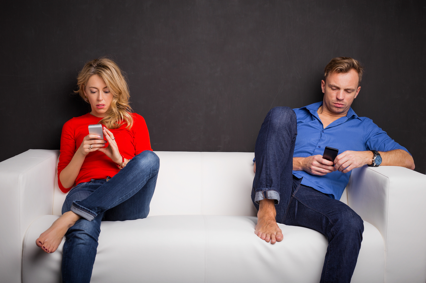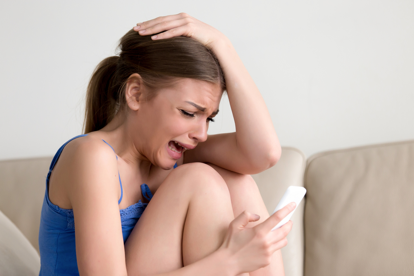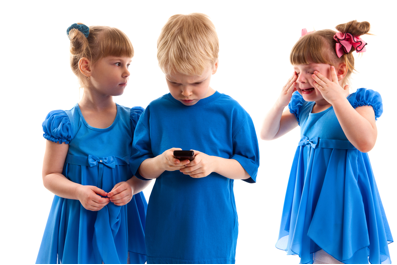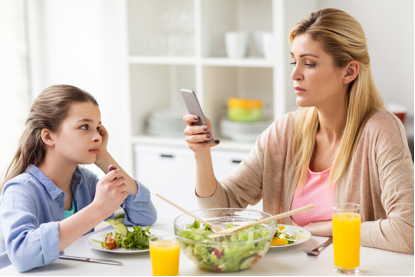Anxiety in the Age of Social Media: What to Do for You & Your Family
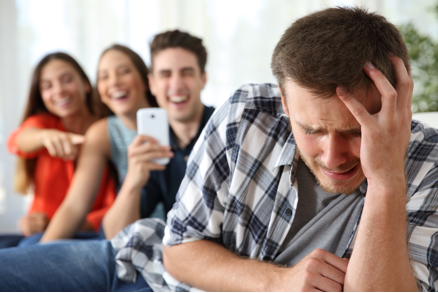
Is social media ruining our relationships and causing anxiety and depression in our teens and tweens?
My wife and I were lucky enough to raise our three children before the age of social media, but the studies I’m reading on the negative and dangerous effects that social media is having on the development of children’s and teenagers social skills, and its role in anxiety and depression certainly has me bothered.
I look around during lunches and dinners and see people together on their phones. There’s something about that that doesn’t sit well with me. It stirs a lot questions about what that means for us as a society.
A Promising Start Goes Bad
Initially social media sites like Facebook, Twitter and Instagram sounded good…more social connectivity, sharing special events and personal news, and keeping in touch with friends and family. I’m all for that.
However, while we may be physically together in the same room, we all too often find ourselves staring at our phones, tablets, and laptops. The very latest research is clearly saying that we are now paying a heavy price for this.
Cell phones bring you closer to the people who are far away from you, but take you away from the person sitting next to you.
Unintended Consequences
Think about all of our millennials, the first real generation who had unprecedented access to technology and social sites during high school and college. There are a lot of articles out there on how millennials lack social and basic life skills. In fact, they have been dubbed The Anxious Generation. Could social media be a partial reason why?
Then I think about parents who are currently raising their children in the age of social media, and after reading the most recent research, it would be easy to feel disheartened.
For example, a recent Pew Research Center study found that 92% of teens go online daily and that 24% say they are online “constantly.” If you think your children are on Facebook and you can follow their activities on the site, you may want to reconsider. A survey of American teens reported that only 15% of kids say Facebook is their favorite social network. Thirty-three percent choose Instagram, 20% go to Twitter, and 19% pick Snapchat, an app that allows them to post pictures — including questionable images of themselves — that disappear after viewing.
Additionally, a recent report from Royal Society for Public Health in the UK called #StatusofMind, surveyed almost 1,500 young people aged 14 to 24 on how certain social media platforms impact health and well-being issues such as self-identity, body image, anxiety, and depression. It found that while YouTube was the only one to have a positive effect, Instagram had the very worst effect on our young people’s sense of well-being, followed by Snapchat.
Instagram, the image-based app with over 700 million users worldwide, sits above all others in terms of social media’s negative impact, most notably among young women. Girls and young women view these images that have been altered and curated and compare themselves to manufactured images and artificial reality. It leaves them feeling inadequate and drives them toward an unattainable status of perfection.
The Brain Keeps Score
Researchers at UCLA’s brain mapping center discovered that when teens received likes on one of their pictures, their brains lit up similar to seeing a loved one or winning money. Other research has shown that the need for social assurance is also associated with the problematic use of Facebook to the point where Facebook can become an addiction, and has even been shown to activate the same brain areas as addictive drugs!
These kinds of addictive behaviors can interfere with social interactions, school, and work. It’s not uncommon to hear people “taking a break,” which for some can cause a vicious cycle of social anxiety, stress, and loneliness.
Increased Anxiety, Depression, and Loneliness
In a poll from CNN.com, 60% of parents underestimated how lonely, worried, and depressed their kids were, and 94% underestimated the amount of fighting that occurred on social media. There are nuances of aggression that are so incredibly subtle. How could a parent understand all of it (especially if you don’t use social media yourself)?
Cyber-Bullying
Imagine the upset of not being tagged in a photo as a planned act of aggression. Posting pictures of a group to show to the others who were left out. You might be surprised at just how young an age this can happen.
This is just one more form of cyber-bullying that may be devastating to your tween or teen, and you may not even know about it. Here are some tips on when and how to give your tween or teen a cell phone.
We Actually Need To Connect With Each Other – Now More Than Ever
It’s easier to sit behind our devices than to have intimate conversations and share our feelings. To be in the real world with one another means that we get to experience the depth of emotion and connection when looking at each other sitting side-by-side, and at the very least, actually pick up the phone and talk with someone if they aren’t close by.
Hack Your Courage
It takes courage to break up with someone over a text versus a real-life conversation. It’s easier to be passive-aggressive online than say, “You hurt my feelings,” with tears in your eyes. It’s no big deal these days to say something hurtful or mean on social media without seeing the emotional impact on the receiver. Maybe we are losing some level of emotional depth and comfort, and ease in being with others. So, that’s the bad news.
Good News!
Fear not. There are some very tangible things that you can do to help your children in the new electronic world that all of us now find ourselves living in.
- Sign up for the social networks that your kids are on and follow them and their friends. Be sure to talk about what you see.
- If they seem upset after being on their phones, ask them about it!
- Dedicating a device-free zone or family time without devices can help rebuild lacking social skills and set norms for social interactions.
- Encourage your child to have conversations with others rather than handle issues online.
- When getting ready for a family meal, have everyone mute or turn off their cell phones and other electronic devices and put them in a basket until the meal is over. Yes, you’ll get some complaints. Too bad! You’re the parent, not a potted plant. Lead by example. This is a more than reasonable request to make of your family.
- Kids are watching you too. Are you putting your phone away and looking into their eyes when they are talking to you? Ask for the same kind of respect from them.
- Limit time on social media. Studies show that kids that spend more than 2 hours a day suffer the most anxiety.
- Collect phones and charge them when teens go to bed. Set a specific time each night so they know what to expect and when. That way you eliminate the possibility of late-night texting and searching social media in the wee hours. Buy them an alarm clock if that is the excuse you get.
- Here are some additional tips to help you with social media and cell phone use.
I hope that you found this article helpful, whether a tween, teen, or adult. Of course, everyone’s situation is different. If you would like some help navigating this intricate world of social media, I invite you to contact me for a free 15-minute phone consultation. I am more than happy to help out in any way I can.

